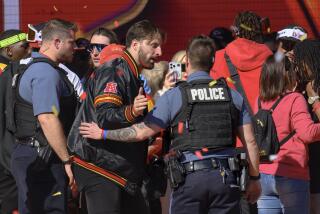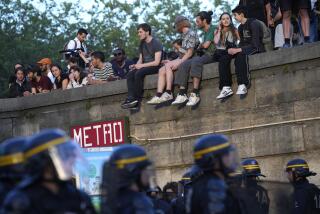‘Dead cops ... that’s what they want,’ says police union’s Jeff Roorda
- Share via
A prominent St. Louis police union official called for a curfew in Ferguson, Mo., after two police officers were shot and wounded early Thursday during a demonstration outside the Ferguson Police Department, saying protesters “want cops dead.”
“Dead cops, dead cops. That’s what they want,” former Democratic state Rep. Jeff Roorda, of the St. Louis Police Officers Assn., said of Ferguson demonstrators on Fox News on Thursday, as reported by website Mediaite.
“You arrest everyone that doesn’t go home,” Roorda said. “Let’s not pretend like they wanted [police Chief] Tom Jackson’s resignation or that they’re mad because Mayor [James] Knowles is there. They want dead cops and that was their goal all along and that was their goal last night.”
Roorda’s remarks come as law enforcement and political leaders and local activists decide how to respond after a shooting early Thursday in which witnesses said an unknown gunman on a hill overlooking the Ferguson Police Department opened fire on officers protecting the station.
One officer was shot in the face and another in the shoulder. Both were treated and released from a hospital Thursday.
Local activists, whose most well-known mainstays are resolutely nonviolent, have condemned the shooting but have not given up on their basic political message.
One top local activist who was at the scene when the shots were fired, DeRay Mckesson, tweeted: “I do not condone the killing of police officers. I do not condone the killing of the unarmed. I do not condone killing.”
In a statement Thursday afternoon, Ferguson Mayor James W. Knowles III did not address the idea of a curfew, but condemned the shooting and called on clergy and local community members to address “threats of violence and destruction to our community.”
The shooting of the two officers in Ferguson has not just been a violent incident, but has also become a kind of subterranean political crisis for activists and political leaders who have pushed for police reform and a change in police tactics while trying to navigate through the stumbling blocks presented by occasional anti-police violence.
In statement after statement Thursday, most public officials have balanced condemnations of the violence while maintaining that protesters’ core claims -- for the right to peaceful protest and for police reform -- have substance.
“You know, seeing this attack last night turned my stomach -- because in the week since the Justice Department released its pattern-and-practice report on Ferguson, we have begun to see really important signs of progress,” outgoing U.S. Atty. Gen. Eric H. Holder Jr. said Thursday, alluding to a federal investigation that accused Ferguson police of unconstitutionally profiling and harassing the town’s predominantly black residents.
“This disgusting and cowardly attack might have been intended to unravel any sense of progress, but I hope that doesn’t happen,” Holder said.
In comparison, the vehement tenor of Roorda’s response -- and the complex political problem faced Thursday by demonstrators and reform-minded officials -- was reminiscent of the political dynamic that befell New York City in December when two police officers were ambushed and killed while sitting in their police cruiser.
The gunman in the New York shooting, who committed suicide shortly afterward, had hinted on social media that he wanted to kill police as revenge for the deaths of black men, starting with 18-year-old Michael Brown who was shot to death Aug. 9 by white Ferguson police Officer Darren Wilson.
The slaying of the New York officers led police union officials to accuse New York City Mayor Bill de Blasio of having blood on his hands for supporting protesters who had criticized in the police, and to the dramatic spectacle of uniformed officers turning their backs on the mayor at the two officers’ funerals.
The New York shooting stalled some of the mainstream support for nationwide protests seeking police reform, which had grown in intensity after a St. Louis grand jury declined to indict Wilson and a New York grand jury decided not to indict the officers accused of strangling to death Staten Island resident Eric Garner last July.
Following the NYPD officers’ funerals, De Blasio, a proponent of police reform, was forced to modulate his statements and to cool down an uncomfortable political standoff with his own police officers, of whom some refused to carry out arrests or perform their usual duties.
After the New York shooting, police reform protests around the country similarly cooled off somewhat over the winter months.
The protest in Ferguson, which began Wednesday evening, came on one of the first warm nights of the year in St. Louis, and on the day of a key victory for activists: the announced resignation of Ferguson police Chief Thomas Jackson.
As many as 200 activists had gathered outside the police station to send the message that they still weren’t satisfied, and that many of them also wanted the resignation of Knowles. The protest was mostly peaceful, though some shouting and shoving broke out, witnesses said. By midnight, only about 50 demonstrators remained gathered in parking lots across the street from the police department.
Things had turned calm -- and that’s when the shots rang out.
Follow @MattDPearce for national news
More to Read
Sign up for Essential California
The most important California stories and recommendations in your inbox every morning.
You may occasionally receive promotional content from the Los Angeles Times.













